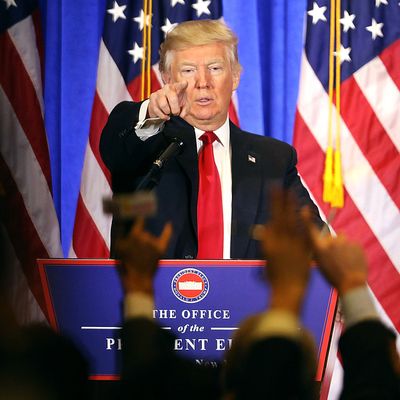
This morning, Donald Trump hosted his much-delayed, long-awaited first news conference as president-elect. Inside the Trump Tower atrium, the atmosphere was as charged as at a highly anticipated prize fight. The last time Trump fielded questions from the press corps was last summer. For weeks, the media had been preparing to challenge him on any number of controversies: his conflicts of interest, polarizing cabinet appointments, decision to appoint his son-in-law as a senior adviser, and, most alarmingly, Vladimir Putin’s apparent efforts to manipulate the election.
Trump being Trump, he didn’t show any interest in directly answering questions. He opened with a rambling monologue that included the pronouncement: “I will be the greatest jobs producer that God ever created.” When asked by a reporter if Russia aided his win, Trump said, “Well, if Putin likes Donald Trump, I consider that an asset.” Questioned whether the American people wanted him to finally release his tax returns, he replied, “No, I don’t think they care at all.” Challenged on the potential conflicts of interest for his cabinet appointees, Trump explained that Rex Tillerson and Jeff Sessions were “brilliant.”
Judged on a policy basis, it was a disaster. Trump came across as just as unprepared and unfocused as he did during his shambolic campaign. He let his lawyer speak for nearly a quarter of the allotted time to explain why he wouldn’t be putting his company into a blind trust and instead would be turning it over to his sons Don Jr. and Eric. For visual effect, aides stacked manila folders on a table next to the lectern. Trump said they were filled with legal papers.
But observed as spectacle, Trump came away with a resounding victory. That’s because Trump won even before he stepped before the microphone, by making the media the story. Last night, BuzzFeed published a salacious 35-page oppo-research dossier on Trump that alleged Russia possessed sexual and financial dirt on Trump that could be used to blackmail him. BuzzFeed justified reporting the unverified oppo-research document — which had been compiled during the presidential campaign by a political operative working for Trump’s Republican rivals — by stating that intelligence agencies had briefed Trump on a summary of the findings last week. But BuzzFeed’s article boomeranged back on the website as journalists were quick to denounce its decision to publish unconfirmed claims and errors. (CNN broke news of the intelligence briefing, but did not print the sensational details.)
Trump exploited this wedge. From the outset, he worked to isolate BuzzFeed and CNN. “I want to thank a lot of the news organizations for some of whom have not treated me very well over the years — a couple in particular — and they came out so strongly against that fake news and the fact that it was written about by primarily one group and one television station,” he said. Trump also deflected attention from the urgent questions at hand by taking aim at the intelligence agencies, which he accused — without proof — of the leak. “It was disgraceful that the intelligence agencies allowed any information that turned out to be so false and fake out … [T]hat’s something that Nazi Germany would have done, and did do.”
For the most part, Trump remained calm and jocular (except when he refused to call on CNN reporter Jim Acosta, yelling “You are fake news!”). He invited reporters to the White House the week after his inauguration. He left the bad-cop routine to his press secretary, Sean Spicer, who called BuzzFeed “a left-wing blog” and said the decision to publish was “outrageous and highly irresponsible.”
The cumulative result is that Trump turned what should have been a serious examination of his incoming administration into a debate over journalistic practices and Michael Cohen’s travel itinerary. BuzzFeed deserves some of the blame for this. Journalists receive oppo research frequently during political campaigns, but publish only what they can verify. By amending this standard for Trump, BuzzFeed handed him an opening to play the victim. Trump thrives in a world where facts are fungible. As the journalist Masha Gessen, who’s covered Putin’s Russia for years, tweeted: “We are now fully immersed in the anonymous, the unverified, and the unverifiable. And he hasn’t even taken office. Trumpism sure is fast.”
The matter of whether Trump campaign officials coordinated with the Kremlin needs to be investigated, and answered definitively. Trump’s propensity to traffic in rumor, gossip, and innuendo makes it ever more important that the news organizations don’t.





























